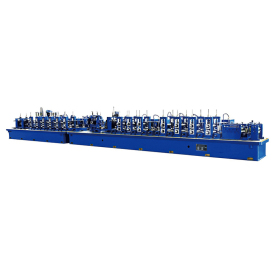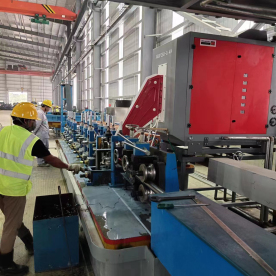[Precision ERW tube mill machinery]Understanding the Importance of Precision ERW Tube Mill Machinery in Modern Manufacturing Processes
News 2024-9-24

Understanding the Importance of Precision ERW Tube Mill Machinery in Modern Manufacturing Processes
**What is ERW Tube Mill Machinery?**
ERW tube mill machinery is designed to produce welded steel and stainless steel tubes. The process entails the use of high-frequency electrical resistance to create a strong, consistent weld seam on the tube as it’s formed from flat steel strips or coils. The mills are equipped with precise controls that ensure the dimensions, wall thickness, and surface finish meet stringent quality standards. By employing advanced technology, these mills facilitate the production of tubes in various sizes and shapes, catering to diverse market demands.

Understanding the Importance of Precision ERW Tube Mill Machinery in Modern Manufacturing Processes
The ERW tube manufacturing process involves several critical steps. Initially, a flat steel strip is fed through a series of rollers that progressively bend it into a cylindrical shape. As the edges of the strip come together, high-frequency current is introduced. This electrical current generates heat, causing the edges to melt and fuse without the need for filler material. The weld is subsequently cooled and solidified, resulting in a strong joint.
Precision ERW tube mills typically utilize induction or contact heating methods to achieve the necessary temperature for welding. Induction welding employs electromagnetic fields, while contact welding relies on direct electrical contacts between the strip edges. Both methods are effective; however, the choice may depend on the specific product requirements and production rates.
**Applications of Precision ERW Tubes**
Precision ERW tubes find extensive applications across various industries due to their strength, lightweight characteristics, and versatility. In the construction sector, they are used extensively for structural applications such as columns, beams, and frameworks where high strength-to-weight ratios are necessary. Additionally, these tubes serve purposes in the automotive industry for exhaust systems, chassis components, and various structural parts.
The oil and gas sector relies on Precision ERW tubes for pipelines and other critical infrastructure. These tubes must withstand significant pressure and harsh environmental conditions. Precision manufacturing ensures that these tubes meet the stringent safety and performance standards necessary for such applications.
In the furniture industry, precision-welded tubes are frequently used to manufacture durable and aesthetically pleasing metal frames. The versatility of ERW tubes allows for innovative designs that blend form and function effectively.
**Advantages of Precision ERW Tube Mill Machinery**
One of the primary advantages of Precision ERW tube mill machinery is its ability to produce high-quality tubes with consistent dimensions and surface finishes. This quality assurance is critical for industries where performance and safety are paramount. Additionally, the machinery can produce tubes at high speeds, significantly increasing overall productivity.
Another advantage is the relatively lower scrap rate associated with ERW tube manufacturing. Because the process is highly controlled, manufacturers can optimize material use, minimizing waste, and subsequently lowering production costs.

Understanding the Importance of Precision ERW Tube Mill Machinery in Modern Manufacturing Processes
**Conclusion**
In conclusion, Precision ERW tube mill machinery is an indispensable component of modern manufacturing, catering to diverse industry needs with high-quality products. As industries continue to evolve and demand more innovative solutions, the importance of precision-engineered processes will only grow. Manufacturers that invest in advanced ERW tube mill technology stand to gain a competitive edge, ensuring they can meet the challenges of an ever-changing market landscape. The versatility, efficiency, and quality of Precision ERW tubes position them as vital elements within a broad array of applications, solidifying their place in the future of manufacturing.
